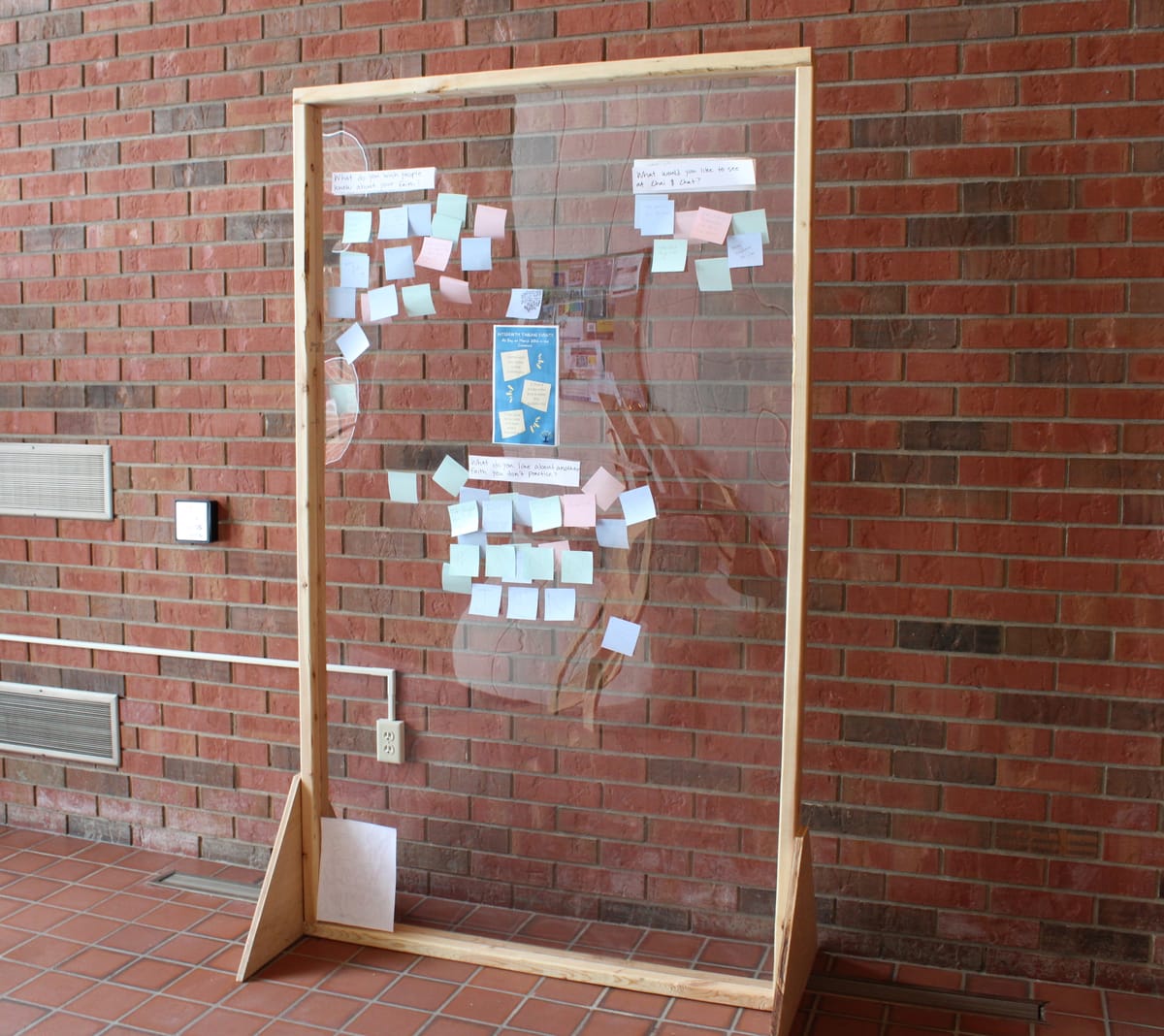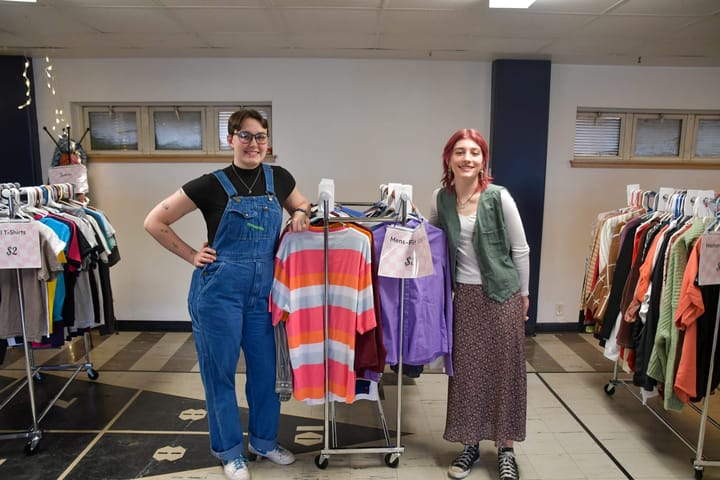Interfaith Council discovers disrespectful notes at event

Augustana’s Interfaith Council celebrated the first day of Interfaith Week on March 20 with a Q&A board in the Morrison Commons, prompting students to reflect on their own faith traditions and what they appreciate about others’.
However, when the Interfaith Council went to read the responses on the board at the end of the event, they discovered several disrespectful notes.
A large plexiglass board in line with the main entrance of the Commons displayed questions related to interfaith work on campus. Students could approach a table nearby from 10:30 a.m. to 6 p.m. to write answers to the questions on sticky notes before pasting them to the board.
The questions included “What do you like about another faith you don’t practice?,” “What do you wish people knew about your faith?” and “What would you like to see at Chai and Chat?”
Freshman Mariam Alinizi, a biology and Spanish major on the Interfaith Council, said staff attended the board until 1 p.m and from 3-6 p.m. She and freshman Ashirvad Sharma were signed up for the last shift from 5-6 p.m.
“We were just looking over the board to see what people were saying, and then all of a sudden we just started seeing weird stuff,” Alinizi said. “It happened slowly.”
Alinizi said they first noticed a response to “What would you like to see more of at Chai and Chat?” that read “Your mother.” She said she initially assumed the note was someone’s attempt to be funny.
“And then we kept looking and we saw the horrible things that people were saying and we just felt really kind of embarrassed and also disgusted that people were saying these kinds of things,” Alinizi said.
Alinizi discovered a total of five inappropriate and discriminatory notes on the board. One read “Black lives don’t matter. WLM.” Another read “There are only two genders.”
In response to “What do you want people to know about your faith?” one student wrote “We are not terrorists.” Later that day, someone attached a sticky note to that student’s response that read, “I might have a bomb in my backpack.”
Rev. Ann Rosendale, campus pastor, said the Interfaith Council alerted herself and Interfaith Chaplain Jennifer Dreiske after taking down the disrespectful notes. Rosendale alerted Campus Safety, and the council brought the board back to the chapel, where it remained for the rest of Interfaith Week.
Alinizi said that while she has noticed most students appreciate the Interfaith Council and its work, she was disheartened to discover the disrespectful notes.
“I thought I left these things back in high school, and I thought that these things were kind of old news, like people didn't really act like this anymore,” Alinizi said. “So just seeing that just really put things into a perspective [for] me and made me realize like, ‘Wow, there are still people like this in the world that just choose to hate and choose to be negative all the time.’”
Rosendale said the notes were hurtful and scary, especially for students of color and students from religious traditions outside of Christianity, Augustana’s dominant faith.
“It’s just another reminder to them that there are people on this campus who don’t respect them and who may not even want them here,” Rosendale said. “That is, I think, what is so troubling about it all.”
According to Rick Tupper, associate vice president of Campus Safety and logistics, having someone at the board for the entirety of the event likely would not have prevented the misuse of the activity.
“Everybody was asked to step up and get out a sticky note and write your note and then put it on a board,” Tupper said. “I mean, even if you had somebody watch, you’d almost have to have them go, ‘Now read everybody’s note before they put it up.’ And you want people to feel safe and comfortable to say ‘Here’s what I want to say and I want to put up there.’”
Alinizi said having constant supervision over the board would have defeated the activity’s purpose.
“The purpose was for these people to anonymously say what they were feeling or what was going on, and having somebody there I think kind of makes them shy and makes them not want to say what they want to say,” Alinizi said.
Rosendale said the Q&A activity arose out of the Interfaith Council’s hope to engage people’s learning and imagination around interfaith as they launched Interfaith Week.
According to Rosendale, Augustana has celebrated Interfaith Week for nearly a decade. The tradition originated with Interfaith America, a national organization that supports students, faculty and staff on campus in interfaith work.
“It’s kind of an opportunity for that community building,” senior Michael Schmidt, an environmental studies and government major on the Interfaith Council, said. “It's an opportunity for recognition. It's an opportunity to be present on campus and feel more supported or even just meet that community.”
First-year KT Pagone, a Spanish and education major and the head of Augie Organizers, said she answered the questions on the board after coming down the stairs.
“I kind of liked the board because it was a place for reflection,” Pagone said. “It’s really cool that the board was see-through because, in a sense, you can see through to the other side and kind of see another person if they’re putting up a board, or if there’s a shadow, you can see yourself, and that’s kind of an internal reflection.”
With seven days of events left in Interfaith Week, Rosendale said she was concerned about the impact the incident would have on the rest of the week.
“My fear when this happened was that this was the first day of Interfaith Week,” Rosendale said. “This Interfaith Council has planned a tremendous lineup of programming, and it's discouraging to have the first event that you do be tarnished in this way. And for those students, it could make them fearful about continuing to do events.”
For Schmidt, the notes were not enough to impede the Interfaith Council’s preparations for an event-filled week recognizing students’ diverse faiths.
“The week’s happening,” Schmidt said. “If it’s going to have delays or things that get shaken up, it’s going to be because of the weather. It’s not going to be because of hate notes written on a sticky note.”
Dreiske, according to Rosendale, gave the council encouragement for the future of Interfaith Week.
“She’s really good at saying, ‘You all as an Interfaith Council are bringing light into this campus. You’re bringing goodness into this campus. You’re bringing a rich and beautiful, diverse perspective. Let’s continue to lean into the light,’” Rosendale said.
Going forward, Tupper said Campus Safety does not really have a way to monitor activities like the Q&A board nor find the culprits.
“I think it's disturbing that there are people that, whether they think it's funny, which there's nothing funny about that, or that they have that belief, both of those are disturbing,” Tupper said. “And obviously, there's somebody that was here. And whether they're a student or somebody on our campus, I don't know. It's concerning.”
Schmidt said the disrespectful sticky notes do not reflect a change in people’s viewpoints but, rather, people’s willingness to address harmful viewpoints in public has increased.
“It’s a note put up on a board. And if nobody saw you doing it, there’s a level of animosity to it that further emboldens that,” Schmidt said.
According to Rosendale, the notes are a reminder that there is still work to be done on campus to educate people about diverse faith traditions and racial identities.
“For people to show up is such a huge gift to the Interfaith Council in terms of encouraging them in their work,” Rosendale said. “When the Interfaith Council knows that the work that they are doing is wanted and matters, that just encourages them and motivates them to continue doing the work. And it’s clearly work that’s needed.”



